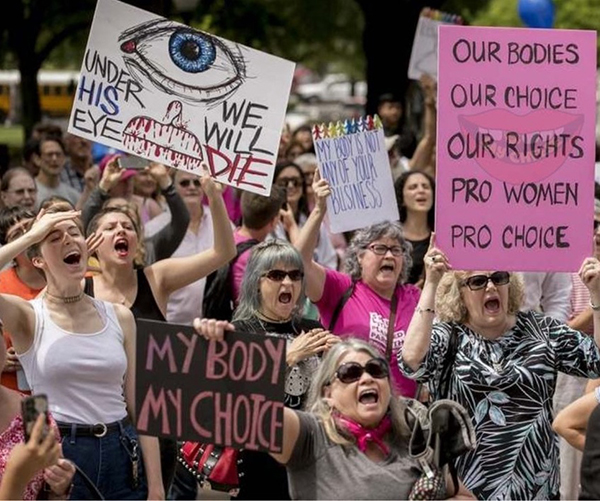By Earl Ofari Hutchinson
Contributing Columnist
On March 8, 2022, three months before the U.S. Supreme Court scuttled Roe v. Wade, thousands of women gathered in dozens of cities nationally. The occasion was International Women’s Day.
This is the second in a two-part series examining the decades-long battle over abortion. It is an excerpt from Earl Ofari Hutchinson’s forthcoming book, “The Abortion Wars” (Middle Passage Press).
That year things were different. The tens of thousands of women marched, rallied and lobbied for one of the most compelling causes that had for decades been one of the central tenets of women’s rights activism. That was the unfettered right of women to abortion.
The movement for women’s reproductive rights was hardly new. It dated back to the latter part of the 19th century. Women had been marching, rallying, picketing and lobbying for the right to abortion for decades before the Supreme Court seemingly decided the issue.
However, on International Women’s Day in March 2022, the sense of urgency had climbed to stratospheric proportions. The Supreme Court had a hardened conservative majority and had sent plenty of signals that Roe v. Wade, for all practical purposes, was dead. The rallying cry that year, as it had been in the decade before, was that the abortion rights movement had transformed into a broader, more expansive reproductive justice movement.
The movement cut across all religious, ethnic, racial and same-sex lines and most importantly age groups. One group that spearheaded the battle for total reproductive rights in decades past reflected the diversity of the reproductive justice movement.
The Grandmothers for Reproductive Rights were older women who had horrid memories of what it was like before Roe v. Wade for women such as themselves to be denied access to legal abortion.
In many cases, the doors in many states were tightly closed to women who were desperate to terminate their pregnancies. Older women remembered that and were out in force again marching, filing suits and lobbying state legislatures to strengthen abortion rights.
“We can’t go back to that,” noted veteran reproductive rights organizer Karen Mulhauser, 76, a member of the organization, “Young people sometimes don’t believe that Roecould be reversed because they’ve grown up seeing abortion always being available, but that’s why women need to tell stories of what it was like when it wasn’t.”
The three biggest players in the reproductive rights movement from the time of the Roe v. Wade decision in 1973 were the Planned Parenthood Federation of America, the National Abortion Rights Action League, and NARL-Pro Choice America. The organizations mobilized countless numbers of women activists, reproductive rights justice supporters and liberal to moderate Democratic legislators, to wage pitched battles against federal, state and executive decisions that put or sought to put endless restrictions and bans on abortion access.
The continued assault on abortion by the right has had a positive blowback effect. It soared the numbers and passion of thousands more women newly recruited to the cause. It forced the pro-choice groups to shift their focus to the states, the courts and medical professional organizations.
Equally important, it prompted a solid game changer for the reproductive rights movement. It wisely adopted another tact that widened the scope and broadened the base of support.
The organizations redefined the fight as not solely the right to abortion for women but a fight for personal liberty and protection of the right to privacy. In September 2023, NARAL Pro-Choice America, one of the major frontline organizations in the battle for abortion rights, made it official. It publicly announced that going forward its new name would be Reproductive Freedom for All.
“The fight for abortion rights and access is at a critical point,” said Mini Timmaraju, president of Reproductive Freedom for All. “With the coalition of Americans who support reproductive freedom growing by the day, our leadership identified a clearer and more inclusive path forward to mobilize this new and expanded base of support.”
She and other abortion rights group spokespersons made clear that their shift in messaging was done with a firm eye on gaining greater sympathy and support from the voters at the state level. Considering the Supreme Court’s decision on Roe v. Wade, this was where the major battles over abortion would be fought.
There is evidence that the shift has paid political dividends in several states where pro-choice forces are able to beat back some of the more draconian efforts to ban or tightly limit abortion accessibility. Freedom of liberty and freedom and privacy will be the key rallying terms in the 2024 presidential election.
The aim is to broaden support from voters to elect more liberal and moderate Democrats to state legislatures and Congress. And most importantly, to ensure a Biden victory.
The reframing of the abortion issue as a personal freedom right is a savvy move in another way. It also increases the chance to garner support from many who had personal and especially religious qualms about abortion. It also further ensures that the Democratic Party will make reproductive rights justice a cornerstone of the party’s policy and advocacy.
That will further swell the number of pro-choice legislators seeking election or reelection. The strategy seems to work. Polls and surveys in the immediate years before the Supreme Court knocked down Roe v. Wadefound a majority of American women said they backed the reproductive rights movement.
However, the lines on the issue remain tightly drawn. Neither side will give ground. The issue will continue to spark debate, discord, division and polarization. Even more, abortion will remain a major hot-button political weapon that Republicans and Democrats will brazenly wield to rile, inflame and sway voters before and after elections.
Earl Ofari Hutchinson is an author and political analyst. He is the host of the weekly Earl Ofari Hutchinson Show from 9 to 10 a.m. Saturday on KPFK 90.7 FM Los Angeles and the Pacifica Network.












